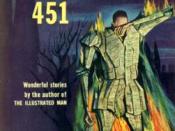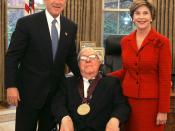Mildred's Static Heart In Fahrenheit 451, Ray Bradbury paints the portrait of a wonderfully dynamic character, in Guy Montag. As we follow Guy on his journey through a world of censorship and lies; we find that while his old world is being ripped apart, that same world has already swallowed up his wife and refuses to let her go. In essence, while Guy's new heart is beating wildly, having been opened up to a new reality with books and truth, his wife Mildred's is a static flat line.
Early in the story, it is evident that Mildred is not happy with her own existence. She complains to her husband that having 3 wall-sized "parlor walls"ÃÂ is not enough entertainment for her. In fact, she believes that Guy is inconsiderate for not putting a fourth wall in place. (Bradbury, 20) It is clear Mildred spends most, if not all of her time in front of her parlor wall.
In fact, she tells Guy she is going to be a part of a new play, with a special part written for her. Yet her ignorance is evident when he asks her what the play is about and she gives the feeble answer of "There are these people named Bob and Ruth and Helen."ÃÂ (Bradbury, 20) Clearly she has no idea that she is merely being stimulated for hours on end with no clear purpose or ideas being presented. As the encounter with the new parlor show ends ,Guy asks Mildred ,"Does the play have a happy ending?"ÃÂ and Mildred answers "I haven't read that far."ÃÂ (Bradbury, 21) These last words from Mildred illustrate her indifference to what is going on in the play, just as long as she is in the play. It makes no difference to her what the story or theme may be, as long as the thinking is done for her and she is taken away from her mundane existence, she is happy.
Mildred shows further the lack of depth she possesses when she is asked late one night by her husband where and when they met. She comes to the conclusion that "It doesn't matter."ÃÂ (Bradbury, 43) In fact, Mildred is clearly annoyed by this question, she questions him "Where did we meet for what?"ÃÂ (Bradbury, 43) This encounter between the spouses is a clear example of Mildred's stagnant character. She refers to the people on her "parlor walls"ÃÂ as aunts and uncles and cousins. (Bradbury, 44) However, she does not know when she first met her own husband. Her absorption into the world created for her on screen is total and complete.
Mildred seems to express a fierce loyalty to the society she lives in whenever Guy tries to threaten her "comfort zone."àIn one encounter Guy is pouring out his frustrations and emotions after having burned a thousand books and a live woman. Mildred is offended that Guy is having second thoughts; she responds "Let me alone, I didn't do anything."à(Bradbury, 52) This is one example of Guy's progression of character and Mildred's lack thereof. While we see Guy exploring new thoughts and starting to question why, Mildred finds the line of thought offensive and wants nothing to do with it. Later in the story she will be become so devoted to her way of life, she will betray her own husband and cause the burning of their house. Even then her only concern is of the parlor walls: "Poor family, poor family, oh everything gone, everything, everything gone now"æ"à(Bradbury, 114) That is the last we see of Mildred, being hauled away by the firemen, her thoughts dwell only on her fictional family. Her conscience cares only for those with whom she loved, and her husband is a mere casualty of that love.
Towards the end of the story we realize that Mildred is a reflection of what Guy once was. She hates thinking, she despises talking, and she dislikes anything out of the ordinary. She has friends over only to watch more television. (Bradbury, 93) Clearly Mildred wants stimulation, at any expense. Her brainwashing at the hands of society shows she is a model citizen: immobile, static, compliant, robotic, and most importantly predictable. While Guy may have realized the horror of his thoughtless society, I believe that the only horror Mildred felt was that she had not turned her husband in sooner





